BAFN200: CBA's Financial Policies, Social Impact & Ethical Issues
VerifiedAdded on 2023/06/14
|8
|2078
|411
Report
AI Summary
This report critically evaluates the financial management practices and policies of the Commonwealth Bank of Australia (CBA) concerning social outcomes and corporate social responsibility, referencing the BAFN200 Principles of Finance course. It identifies ethical breaches by CBA, including anti-money laundering violations and poor financial planning advice, analyzing these violations through utilitarianism and rights-based ethical theories. The report assesses CBA's alignment of financial practices with corporate social responsibility, considering sustainability and environmental impacts. It concludes that while CBA incorporates social responsibility into its operations, significant ethical breaches have occurred, impacting stakeholders and violating established ethical principles. Desklib provides access to similar solved assignments and past papers for students.
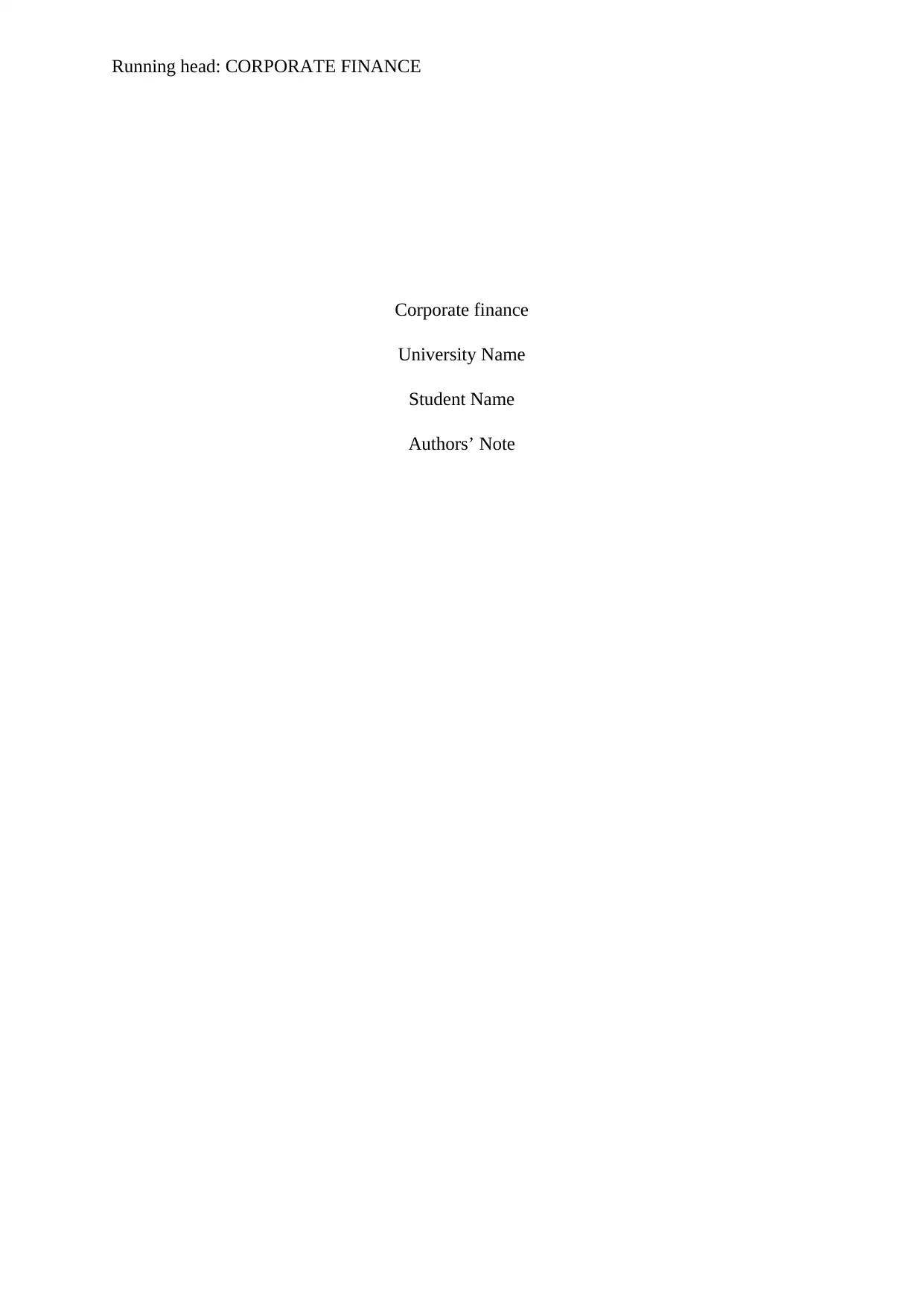
Running head: CORPORATE FINANCE
Corporate finance
University Name
Student Name
Authors’ Note
Corporate finance
University Name
Student Name
Authors’ Note
Paraphrase This Document
Need a fresh take? Get an instant paraphrase of this document with our AI Paraphraser
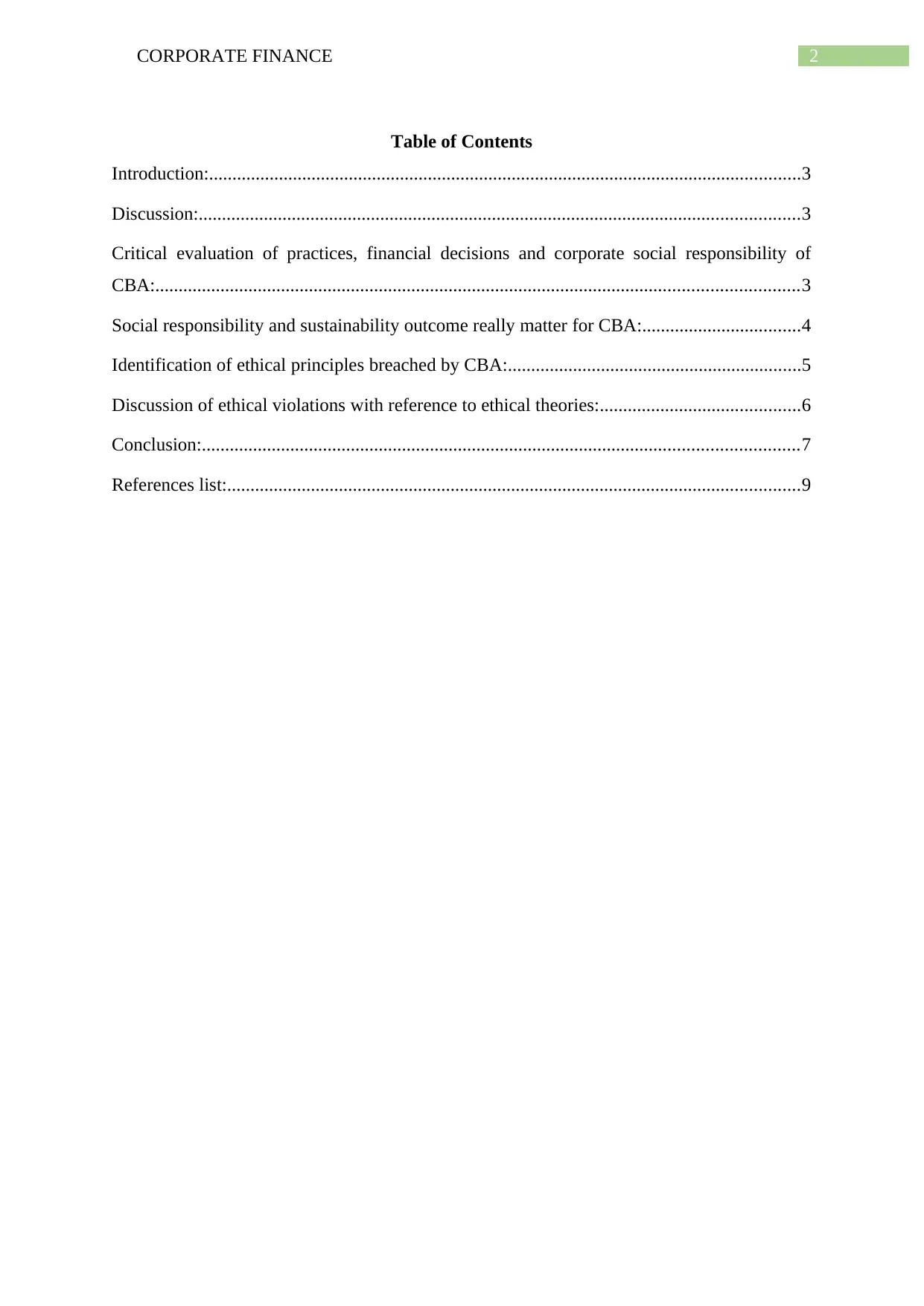
2CORPORATE FINANCE
Table of Contents
Introduction:...............................................................................................................................3
Discussion:.................................................................................................................................3
Critical evaluation of practices, financial decisions and corporate social responsibility of
CBA:..........................................................................................................................................3
Social responsibility and sustainability outcome really matter for CBA:..................................4
Identification of ethical principles breached by CBA:...............................................................5
Discussion of ethical violations with reference to ethical theories:...........................................6
Conclusion:................................................................................................................................7
References list:...........................................................................................................................9
Table of Contents
Introduction:...............................................................................................................................3
Discussion:.................................................................................................................................3
Critical evaluation of practices, financial decisions and corporate social responsibility of
CBA:..........................................................................................................................................3
Social responsibility and sustainability outcome really matter for CBA:..................................4
Identification of ethical principles breached by CBA:...............................................................5
Discussion of ethical violations with reference to ethical theories:...........................................6
Conclusion:................................................................................................................................7
References list:...........................................................................................................................9
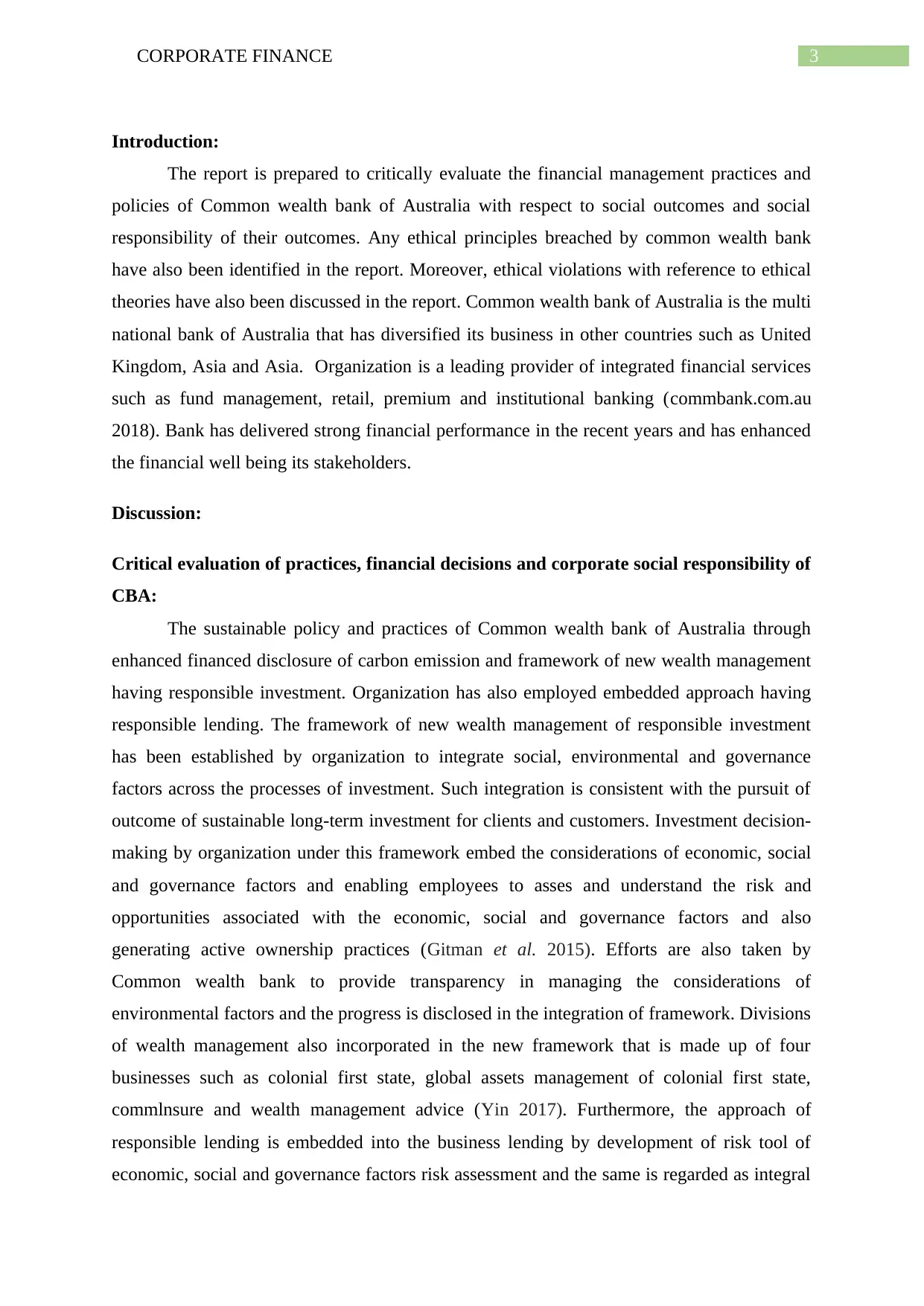
3CORPORATE FINANCE
Introduction:
The report is prepared to critically evaluate the financial management practices and
policies of Common wealth bank of Australia with respect to social outcomes and social
responsibility of their outcomes. Any ethical principles breached by common wealth bank
have also been identified in the report. Moreover, ethical violations with reference to ethical
theories have also been discussed in the report. Common wealth bank of Australia is the multi
national bank of Australia that has diversified its business in other countries such as United
Kingdom, Asia and Asia. Organization is a leading provider of integrated financial services
such as fund management, retail, premium and institutional banking (commbank.com.au
2018). Bank has delivered strong financial performance in the recent years and has enhanced
the financial well being its stakeholders.
Discussion:
Critical evaluation of practices, financial decisions and corporate social responsibility of
CBA:
The sustainable policy and practices of Common wealth bank of Australia through
enhanced financed disclosure of carbon emission and framework of new wealth management
having responsible investment. Organization has also employed embedded approach having
responsible lending. The framework of new wealth management of responsible investment
has been established by organization to integrate social, environmental and governance
factors across the processes of investment. Such integration is consistent with the pursuit of
outcome of sustainable long-term investment for clients and customers. Investment decision-
making by organization under this framework embed the considerations of economic, social
and governance factors and enabling employees to asses and understand the risk and
opportunities associated with the economic, social and governance factors and also
generating active ownership practices (Gitman et al. 2015). Efforts are also taken by
Common wealth bank to provide transparency in managing the considerations of
environmental factors and the progress is disclosed in the integration of framework. Divisions
of wealth management also incorporated in the new framework that is made up of four
businesses such as colonial first state, global assets management of colonial first state,
commlnsure and wealth management advice (Yin 2017). Furthermore, the approach of
responsible lending is embedded into the business lending by development of risk tool of
economic, social and governance factors risk assessment and the same is regarded as integral
Introduction:
The report is prepared to critically evaluate the financial management practices and
policies of Common wealth bank of Australia with respect to social outcomes and social
responsibility of their outcomes. Any ethical principles breached by common wealth bank
have also been identified in the report. Moreover, ethical violations with reference to ethical
theories have also been discussed in the report. Common wealth bank of Australia is the multi
national bank of Australia that has diversified its business in other countries such as United
Kingdom, Asia and Asia. Organization is a leading provider of integrated financial services
such as fund management, retail, premium and institutional banking (commbank.com.au
2018). Bank has delivered strong financial performance in the recent years and has enhanced
the financial well being its stakeholders.
Discussion:
Critical evaluation of practices, financial decisions and corporate social responsibility of
CBA:
The sustainable policy and practices of Common wealth bank of Australia through
enhanced financed disclosure of carbon emission and framework of new wealth management
having responsible investment. Organization has also employed embedded approach having
responsible lending. The framework of new wealth management of responsible investment
has been established by organization to integrate social, environmental and governance
factors across the processes of investment. Such integration is consistent with the pursuit of
outcome of sustainable long-term investment for clients and customers. Investment decision-
making by organization under this framework embed the considerations of economic, social
and governance factors and enabling employees to asses and understand the risk and
opportunities associated with the economic, social and governance factors and also
generating active ownership practices (Gitman et al. 2015). Efforts are also taken by
Common wealth bank to provide transparency in managing the considerations of
environmental factors and the progress is disclosed in the integration of framework. Divisions
of wealth management also incorporated in the new framework that is made up of four
businesses such as colonial first state, global assets management of colonial first state,
commlnsure and wealth management advice (Yin 2017). Furthermore, the approach of
responsible lending is embedded into the business lending by development of risk tool of
economic, social and governance factors risk assessment and the same is regarded as integral
⊘ This is a preview!⊘
Do you want full access?
Subscribe today to unlock all pages.

Trusted by 1+ million students worldwide
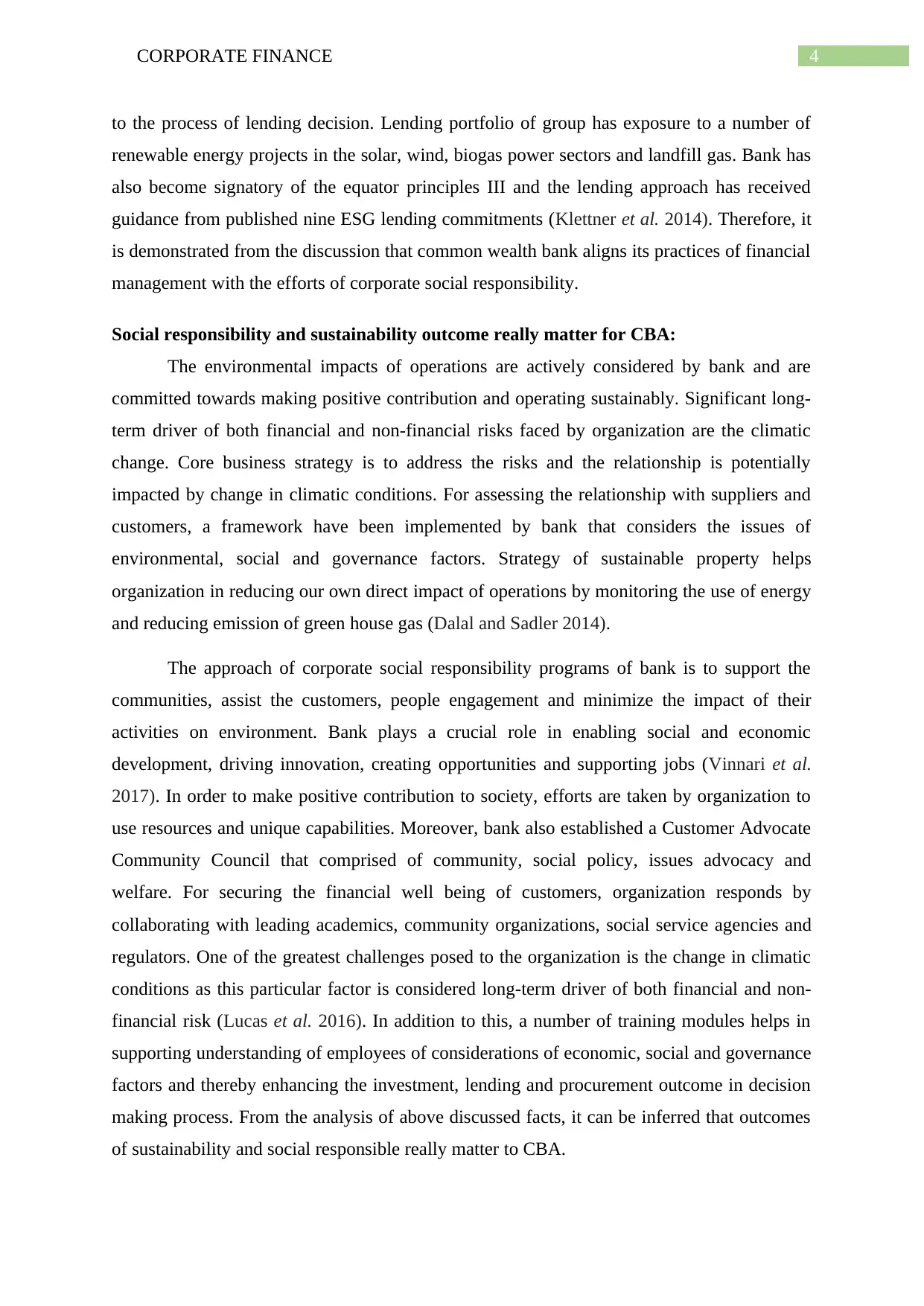
4CORPORATE FINANCE
to the process of lending decision. Lending portfolio of group has exposure to a number of
renewable energy projects in the solar, wind, biogas power sectors and landfill gas. Bank has
also become signatory of the equator principles III and the lending approach has received
guidance from published nine ESG lending commitments (Klettner et al. 2014). Therefore, it
is demonstrated from the discussion that common wealth bank aligns its practices of financial
management with the efforts of corporate social responsibility.
Social responsibility and sustainability outcome really matter for CBA:
The environmental impacts of operations are actively considered by bank and are
committed towards making positive contribution and operating sustainably. Significant long-
term driver of both financial and non-financial risks faced by organization are the climatic
change. Core business strategy is to address the risks and the relationship is potentially
impacted by change in climatic conditions. For assessing the relationship with suppliers and
customers, a framework have been implemented by bank that considers the issues of
environmental, social and governance factors. Strategy of sustainable property helps
organization in reducing our own direct impact of operations by monitoring the use of energy
and reducing emission of green house gas (Dalal and Sadler 2014).
The approach of corporate social responsibility programs of bank is to support the
communities, assist the customers, people engagement and minimize the impact of their
activities on environment. Bank plays a crucial role in enabling social and economic
development, driving innovation, creating opportunities and supporting jobs (Vinnari et al.
2017). In order to make positive contribution to society, efforts are taken by organization to
use resources and unique capabilities. Moreover, bank also established a Customer Advocate
Community Council that comprised of community, social policy, issues advocacy and
welfare. For securing the financial well being of customers, organization responds by
collaborating with leading academics, community organizations, social service agencies and
regulators. One of the greatest challenges posed to the organization is the change in climatic
conditions as this particular factor is considered long-term driver of both financial and non-
financial risk (Lucas et al. 2016). In addition to this, a number of training modules helps in
supporting understanding of employees of considerations of economic, social and governance
factors and thereby enhancing the investment, lending and procurement outcome in decision
making process. From the analysis of above discussed facts, it can be inferred that outcomes
of sustainability and social responsible really matter to CBA.
to the process of lending decision. Lending portfolio of group has exposure to a number of
renewable energy projects in the solar, wind, biogas power sectors and landfill gas. Bank has
also become signatory of the equator principles III and the lending approach has received
guidance from published nine ESG lending commitments (Klettner et al. 2014). Therefore, it
is demonstrated from the discussion that common wealth bank aligns its practices of financial
management with the efforts of corporate social responsibility.
Social responsibility and sustainability outcome really matter for CBA:
The environmental impacts of operations are actively considered by bank and are
committed towards making positive contribution and operating sustainably. Significant long-
term driver of both financial and non-financial risks faced by organization are the climatic
change. Core business strategy is to address the risks and the relationship is potentially
impacted by change in climatic conditions. For assessing the relationship with suppliers and
customers, a framework have been implemented by bank that considers the issues of
environmental, social and governance factors. Strategy of sustainable property helps
organization in reducing our own direct impact of operations by monitoring the use of energy
and reducing emission of green house gas (Dalal and Sadler 2014).
The approach of corporate social responsibility programs of bank is to support the
communities, assist the customers, people engagement and minimize the impact of their
activities on environment. Bank plays a crucial role in enabling social and economic
development, driving innovation, creating opportunities and supporting jobs (Vinnari et al.
2017). In order to make positive contribution to society, efforts are taken by organization to
use resources and unique capabilities. Moreover, bank also established a Customer Advocate
Community Council that comprised of community, social policy, issues advocacy and
welfare. For securing the financial well being of customers, organization responds by
collaborating with leading academics, community organizations, social service agencies and
regulators. One of the greatest challenges posed to the organization is the change in climatic
conditions as this particular factor is considered long-term driver of both financial and non-
financial risk (Lucas et al. 2016). In addition to this, a number of training modules helps in
supporting understanding of employees of considerations of economic, social and governance
factors and thereby enhancing the investment, lending and procurement outcome in decision
making process. From the analysis of above discussed facts, it can be inferred that outcomes
of sustainability and social responsible really matter to CBA.
Paraphrase This Document
Need a fresh take? Get an instant paraphrase of this document with our AI Paraphraser
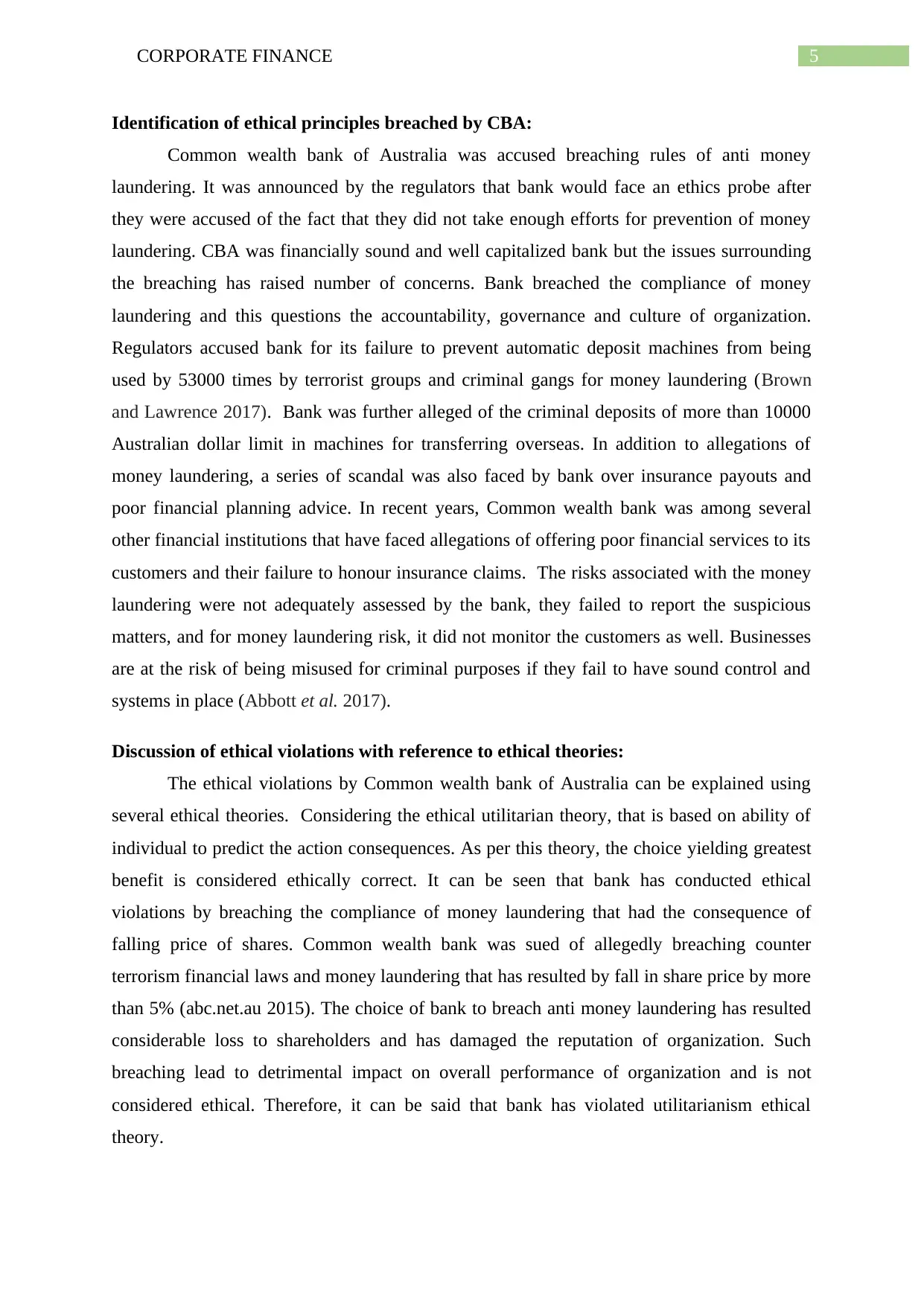
5CORPORATE FINANCE
Identification of ethical principles breached by CBA:
Common wealth bank of Australia was accused breaching rules of anti money
laundering. It was announced by the regulators that bank would face an ethics probe after
they were accused of the fact that they did not take enough efforts for prevention of money
laundering. CBA was financially sound and well capitalized bank but the issues surrounding
the breaching has raised number of concerns. Bank breached the compliance of money
laundering and this questions the accountability, governance and culture of organization.
Regulators accused bank for its failure to prevent automatic deposit machines from being
used by 53000 times by terrorist groups and criminal gangs for money laundering (Brown
and Lawrence 2017). Bank was further alleged of the criminal deposits of more than 10000
Australian dollar limit in machines for transferring overseas. In addition to allegations of
money laundering, a series of scandal was also faced by bank over insurance payouts and
poor financial planning advice. In recent years, Common wealth bank was among several
other financial institutions that have faced allegations of offering poor financial services to its
customers and their failure to honour insurance claims. The risks associated with the money
laundering were not adequately assessed by the bank, they failed to report the suspicious
matters, and for money laundering risk, it did not monitor the customers as well. Businesses
are at the risk of being misused for criminal purposes if they fail to have sound control and
systems in place (Abbott et al. 2017).
Discussion of ethical violations with reference to ethical theories:
The ethical violations by Common wealth bank of Australia can be explained using
several ethical theories. Considering the ethical utilitarian theory, that is based on ability of
individual to predict the action consequences. As per this theory, the choice yielding greatest
benefit is considered ethically correct. It can be seen that bank has conducted ethical
violations by breaching the compliance of money laundering that had the consequence of
falling price of shares. Common wealth bank was sued of allegedly breaching counter
terrorism financial laws and money laundering that has resulted by fall in share price by more
than 5% (abc.net.au 2015). The choice of bank to breach anti money laundering has resulted
considerable loss to shareholders and has damaged the reputation of organization. Such
breaching lead to detrimental impact on overall performance of organization and is not
considered ethical. Therefore, it can be said that bank has violated utilitarianism ethical
theory.
Identification of ethical principles breached by CBA:
Common wealth bank of Australia was accused breaching rules of anti money
laundering. It was announced by the regulators that bank would face an ethics probe after
they were accused of the fact that they did not take enough efforts for prevention of money
laundering. CBA was financially sound and well capitalized bank but the issues surrounding
the breaching has raised number of concerns. Bank breached the compliance of money
laundering and this questions the accountability, governance and culture of organization.
Regulators accused bank for its failure to prevent automatic deposit machines from being
used by 53000 times by terrorist groups and criminal gangs for money laundering (Brown
and Lawrence 2017). Bank was further alleged of the criminal deposits of more than 10000
Australian dollar limit in machines for transferring overseas. In addition to allegations of
money laundering, a series of scandal was also faced by bank over insurance payouts and
poor financial planning advice. In recent years, Common wealth bank was among several
other financial institutions that have faced allegations of offering poor financial services to its
customers and their failure to honour insurance claims. The risks associated with the money
laundering were not adequately assessed by the bank, they failed to report the suspicious
matters, and for money laundering risk, it did not monitor the customers as well. Businesses
are at the risk of being misused for criminal purposes if they fail to have sound control and
systems in place (Abbott et al. 2017).
Discussion of ethical violations with reference to ethical theories:
The ethical violations by Common wealth bank of Australia can be explained using
several ethical theories. Considering the ethical utilitarian theory, that is based on ability of
individual to predict the action consequences. As per this theory, the choice yielding greatest
benefit is considered ethically correct. It can be seen that bank has conducted ethical
violations by breaching the compliance of money laundering that had the consequence of
falling price of shares. Common wealth bank was sued of allegedly breaching counter
terrorism financial laws and money laundering that has resulted by fall in share price by more
than 5% (abc.net.au 2015). The choice of bank to breach anti money laundering has resulted
considerable loss to shareholders and has damaged the reputation of organization. Such
breaching lead to detrimental impact on overall performance of organization and is not
considered ethical. Therefore, it can be said that bank has violated utilitarianism ethical
theory.
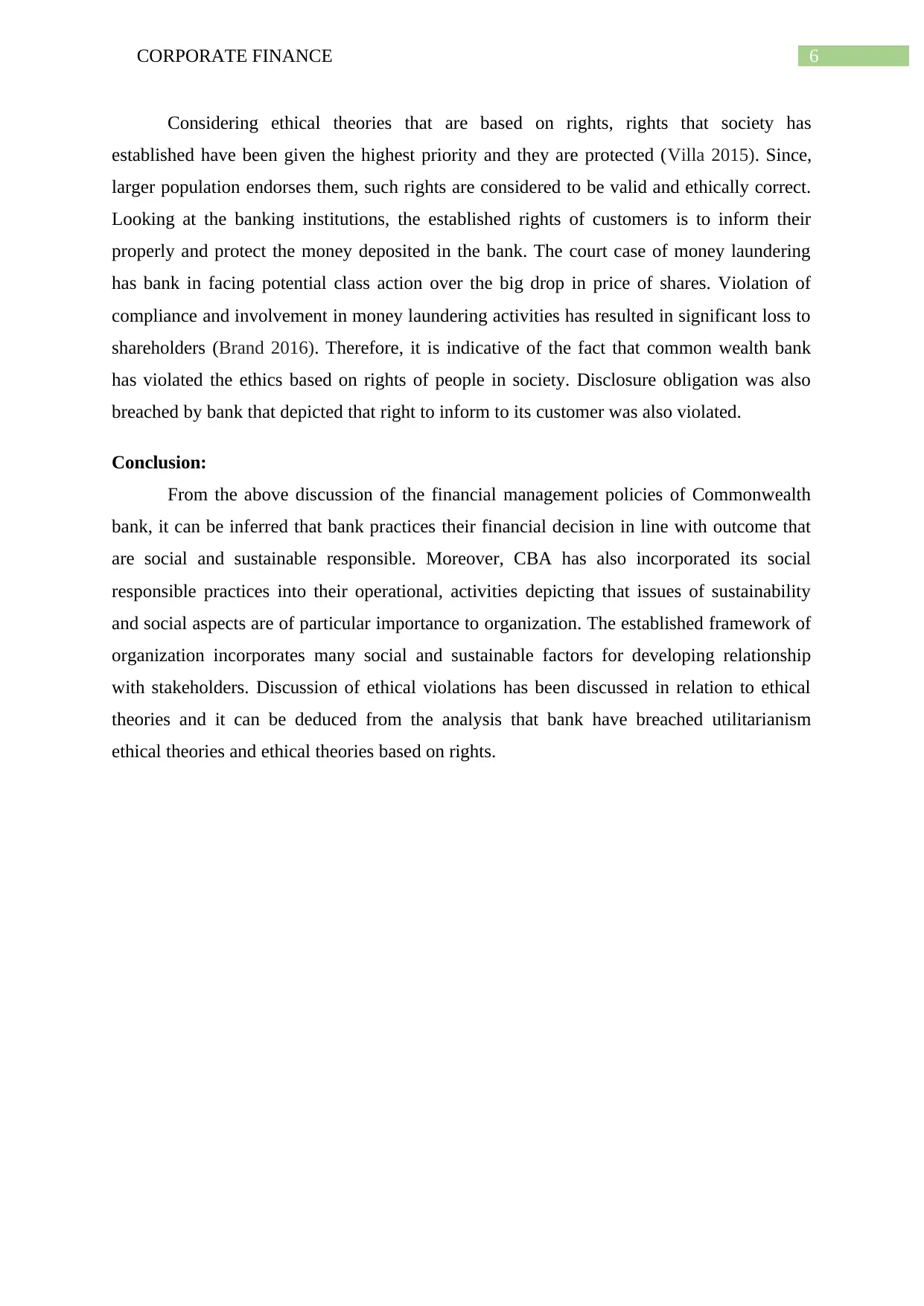
6CORPORATE FINANCE
Considering ethical theories that are based on rights, rights that society has
established have been given the highest priority and they are protected (Villa 2015). Since,
larger population endorses them, such rights are considered to be valid and ethically correct.
Looking at the banking institutions, the established rights of customers is to inform their
properly and protect the money deposited in the bank. The court case of money laundering
has bank in facing potential class action over the big drop in price of shares. Violation of
compliance and involvement in money laundering activities has resulted in significant loss to
shareholders (Brand 2016). Therefore, it is indicative of the fact that common wealth bank
has violated the ethics based on rights of people in society. Disclosure obligation was also
breached by bank that depicted that right to inform to its customer was also violated.
Conclusion:
From the above discussion of the financial management policies of Commonwealth
bank, it can be inferred that bank practices their financial decision in line with outcome that
are social and sustainable responsible. Moreover, CBA has also incorporated its social
responsible practices into their operational, activities depicting that issues of sustainability
and social aspects are of particular importance to organization. The established framework of
organization incorporates many social and sustainable factors for developing relationship
with stakeholders. Discussion of ethical violations has been discussed in relation to ethical
theories and it can be deduced from the analysis that bank have breached utilitarianism
ethical theories and ethical theories based on rights.
Considering ethical theories that are based on rights, rights that society has
established have been given the highest priority and they are protected (Villa 2015). Since,
larger population endorses them, such rights are considered to be valid and ethically correct.
Looking at the banking institutions, the established rights of customers is to inform their
properly and protect the money deposited in the bank. The court case of money laundering
has bank in facing potential class action over the big drop in price of shares. Violation of
compliance and involvement in money laundering activities has resulted in significant loss to
shareholders (Brand 2016). Therefore, it is indicative of the fact that common wealth bank
has violated the ethics based on rights of people in society. Disclosure obligation was also
breached by bank that depicted that right to inform to its customer was also violated.
Conclusion:
From the above discussion of the financial management policies of Commonwealth
bank, it can be inferred that bank practices their financial decision in line with outcome that
are social and sustainable responsible. Moreover, CBA has also incorporated its social
responsible practices into their operational, activities depicting that issues of sustainability
and social aspects are of particular importance to organization. The established framework of
organization incorporates many social and sustainable factors for developing relationship
with stakeholders. Discussion of ethical violations has been discussed in relation to ethical
theories and it can be deduced from the analysis that bank have breached utilitarianism
ethical theories and ethical theories based on rights.
⊘ This is a preview!⊘
Do you want full access?
Subscribe today to unlock all pages.

Trusted by 1+ million students worldwide
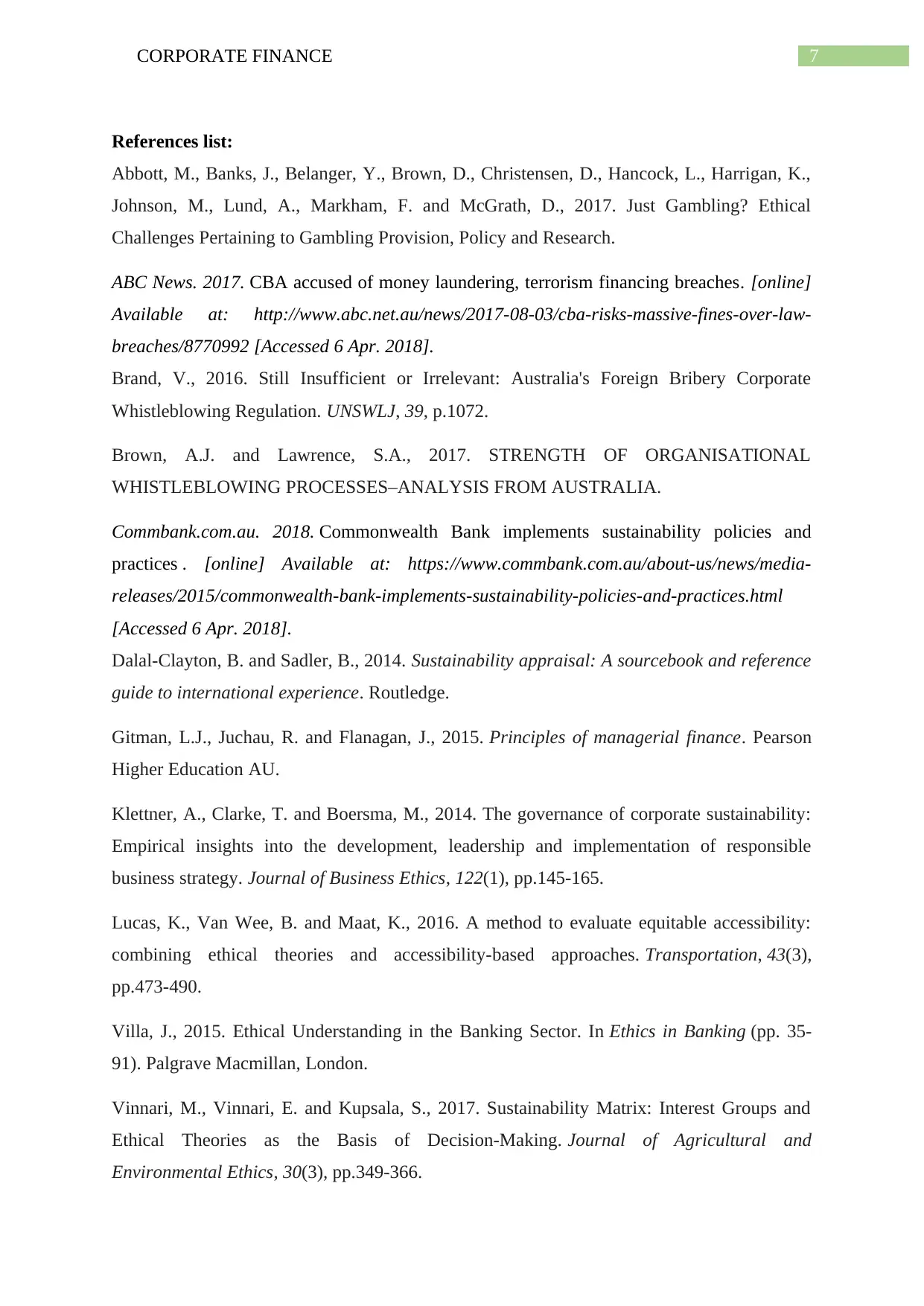
7CORPORATE FINANCE
References list:
Abbott, M., Banks, J., Belanger, Y., Brown, D., Christensen, D., Hancock, L., Harrigan, K.,
Johnson, M., Lund, A., Markham, F. and McGrath, D., 2017. Just Gambling? Ethical
Challenges Pertaining to Gambling Provision, Policy and Research.
ABC News. 2017. CBA accused of money laundering, terrorism financing breaches. [online]
Available at: http://www.abc.net.au/news/2017-08-03/cba-risks-massive-fines-over-law-
breaches/8770992 [Accessed 6 Apr. 2018].
Brand, V., 2016. Still Insufficient or Irrelevant: Australia's Foreign Bribery Corporate
Whistleblowing Regulation. UNSWLJ, 39, p.1072.
Brown, A.J. and Lawrence, S.A., 2017. STRENGTH OF ORGANISATIONAL
WHISTLEBLOWING PROCESSES–ANALYSIS FROM AUSTRALIA.
Commbank.com.au. 2018. Commonwealth Bank implements sustainability policies and
practices . [online] Available at: https://www.commbank.com.au/about-us/news/media-
releases/2015/commonwealth-bank-implements-sustainability-policies-and-practices.html
[Accessed 6 Apr. 2018].
Dalal-Clayton, B. and Sadler, B., 2014. Sustainability appraisal: A sourcebook and reference
guide to international experience. Routledge.
Gitman, L.J., Juchau, R. and Flanagan, J., 2015. Principles of managerial finance. Pearson
Higher Education AU.
Klettner, A., Clarke, T. and Boersma, M., 2014. The governance of corporate sustainability:
Empirical insights into the development, leadership and implementation of responsible
business strategy. Journal of Business Ethics, 122(1), pp.145-165.
Lucas, K., Van Wee, B. and Maat, K., 2016. A method to evaluate equitable accessibility:
combining ethical theories and accessibility-based approaches. Transportation, 43(3),
pp.473-490.
Villa, J., 2015. Ethical Understanding in the Banking Sector. In Ethics in Banking (pp. 35-
91). Palgrave Macmillan, London.
Vinnari, M., Vinnari, E. and Kupsala, S., 2017. Sustainability Matrix: Interest Groups and
Ethical Theories as the Basis of Decision-Making. Journal of Agricultural and
Environmental Ethics, 30(3), pp.349-366.
References list:
Abbott, M., Banks, J., Belanger, Y., Brown, D., Christensen, D., Hancock, L., Harrigan, K.,
Johnson, M., Lund, A., Markham, F. and McGrath, D., 2017. Just Gambling? Ethical
Challenges Pertaining to Gambling Provision, Policy and Research.
ABC News. 2017. CBA accused of money laundering, terrorism financing breaches. [online]
Available at: http://www.abc.net.au/news/2017-08-03/cba-risks-massive-fines-over-law-
breaches/8770992 [Accessed 6 Apr. 2018].
Brand, V., 2016. Still Insufficient or Irrelevant: Australia's Foreign Bribery Corporate
Whistleblowing Regulation. UNSWLJ, 39, p.1072.
Brown, A.J. and Lawrence, S.A., 2017. STRENGTH OF ORGANISATIONAL
WHISTLEBLOWING PROCESSES–ANALYSIS FROM AUSTRALIA.
Commbank.com.au. 2018. Commonwealth Bank implements sustainability policies and
practices . [online] Available at: https://www.commbank.com.au/about-us/news/media-
releases/2015/commonwealth-bank-implements-sustainability-policies-and-practices.html
[Accessed 6 Apr. 2018].
Dalal-Clayton, B. and Sadler, B., 2014. Sustainability appraisal: A sourcebook and reference
guide to international experience. Routledge.
Gitman, L.J., Juchau, R. and Flanagan, J., 2015. Principles of managerial finance. Pearson
Higher Education AU.
Klettner, A., Clarke, T. and Boersma, M., 2014. The governance of corporate sustainability:
Empirical insights into the development, leadership and implementation of responsible
business strategy. Journal of Business Ethics, 122(1), pp.145-165.
Lucas, K., Van Wee, B. and Maat, K., 2016. A method to evaluate equitable accessibility:
combining ethical theories and accessibility-based approaches. Transportation, 43(3),
pp.473-490.
Villa, J., 2015. Ethical Understanding in the Banking Sector. In Ethics in Banking (pp. 35-
91). Palgrave Macmillan, London.
Vinnari, M., Vinnari, E. and Kupsala, S., 2017. Sustainability Matrix: Interest Groups and
Ethical Theories as the Basis of Decision-Making. Journal of Agricultural and
Environmental Ethics, 30(3), pp.349-366.
Paraphrase This Document
Need a fresh take? Get an instant paraphrase of this document with our AI Paraphraser
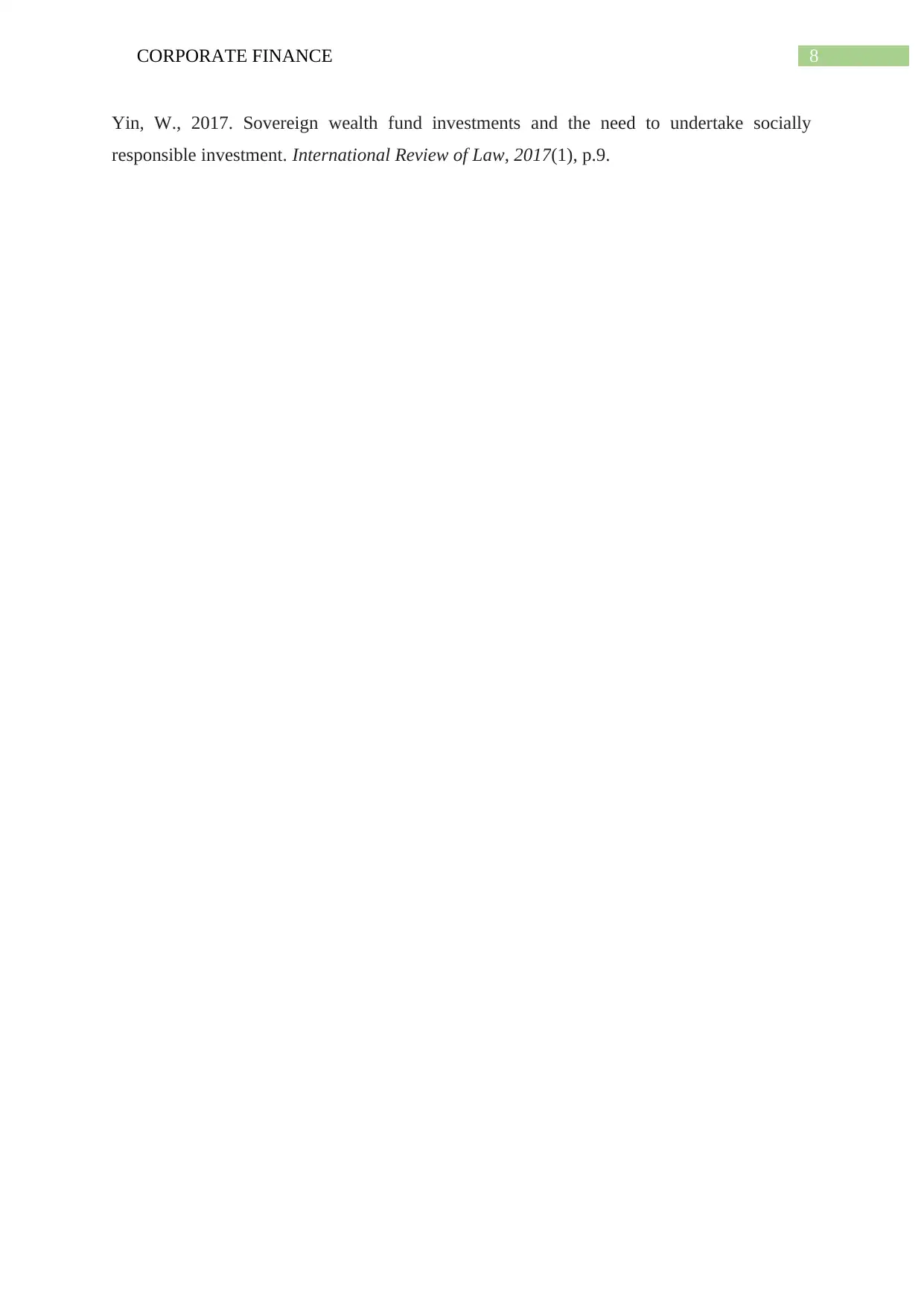
8CORPORATE FINANCE
Yin, W., 2017. Sovereign wealth fund investments and the need to undertake socially
responsible investment. International Review of Law, 2017(1), p.9.
Yin, W., 2017. Sovereign wealth fund investments and the need to undertake socially
responsible investment. International Review of Law, 2017(1), p.9.
1 out of 8
Related Documents
Your All-in-One AI-Powered Toolkit for Academic Success.
+13062052269
info@desklib.com
Available 24*7 on WhatsApp / Email
![[object Object]](/_next/static/media/star-bottom.7253800d.svg)
Unlock your academic potential
Copyright © 2020–2026 A2Z Services. All Rights Reserved. Developed and managed by ZUCOL.




